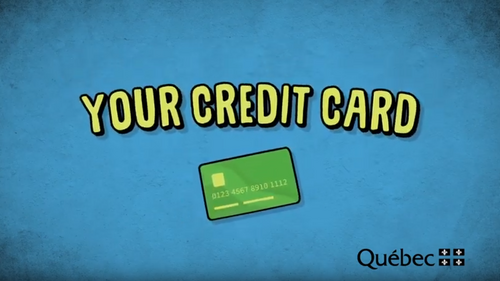
Your Credit Card
Objectives
- Identify the main reason people give for using credit.
- List the elements considered when determining eligibility for credit.
- Describe the risks associated with using credit.
- Name the main types of credit contracts.
- Indicate what information must be included in a credit contract.
- Identify certain rights and responsibilities of a consumer who takes out a variable credit contract.
Description
After watching a funny video about getting a credit card, students answer questions about credit card contracts, refunds, chargebacks, debt collection and more.
Equipment
- Board;
- IWB or projector;
- Internet connection;
- Your Credit Card video;
- Student worksheet;
- Answer key.
Introduction
Before watching the video on credit cards, the teacher leads a discussion to introduce the topic.
Q : What is credit?
A : Potential answers: Credit is an amount granted in advance by a creditor (lender) and made available to a consumer (borrower), who can make use of some or all of it from time to time. From the creditor’s perspective, it is a debt—in other words, it’s the creditor’s right to obtain repayment of that amount plus payment of compensation (interest) according to a set schedule. From the borrower’s point of view, it is a debt they will have to repay.
Q : Have you ever used a credit card?
A : Wide range of answers
Q : What are the benefits and risks of a credit card?
A : Potential answers:
| Benefits A credit card lets you... | Risks A credit card is risky because... |
|---|---|
|
|
Q : Who issues credit cards?
A : Large credit card companies (Visa, Mastercard), financial institutions (banks) and businesses (stores).
Q : What is credit card eligibility based on?
A : Your credit history and score, your income (for some cards).
When determining eligibility for general credit (e.g., a personal loan), other criteria are added, such as job stability, debt level, or repayment habits. Next, the teacher shows the students the video titled Your Credit Card (length: 3 minutes).
Q : What's your takeaway from the Your Credit Card video?
A : Wide range of answers
Instructions
In teams, students answer the questions on the student worksheet.
Conclusion
Once the students have completed the worksheet, the teacher addresses the entire class. He or she asks the teams, each in turn, to share their answers to the questions.
Before wrapping up, the teacher asks the students what advice they would give Max to get out of debt and take control of his finances again. He or she writes the suggestions on the board.
Potential answers:
- Make a budget to live within your means.
- Reduce your living expenses, for example, by selling your car, moving to a more affordable apartment, getting a roommate, or limiting expensive outings.
- Meet with a budget advisor from a consumer association.
- Calculate how many hours you’ll have to work to pay for a purchase, then decide whether it’s worth it.
- Pay for purchases in cash.
- Don’t be tempted by offers like “Buy now, pay nothing for a year.”
- Wait a few days when you get the urge to make a purchase and think about whether you really need the item. Often the urge subsides.
- Shop around for another form of credit with a lower interest rate so you can transfer your credit card balance to it (then stop using your credit card).
- Make a higher monthly payment to pay off your credit card balance faster and pay less credit charges.
- Etc.
Available resources:
Consumer associations: Anyone looking for useful tips, sound advice and practical tools for managing their personal finances or anyone who is in debt can contact the consumer association in their region. Toutbiencalcule.ca [French only]










